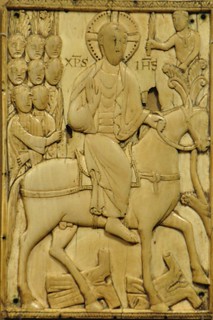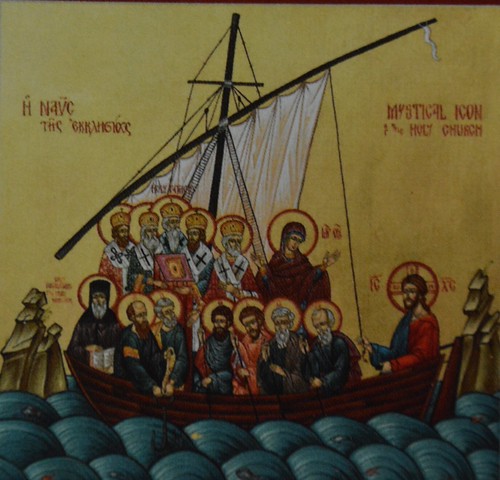The hymns from Great and Holy Monday give us some indication as to what it means to be a Christian. Orthodoxy places a lot of emphasis on fasting during Lent, and yet fasting is not the goal of the spiritual life. In the three hymns, below, we find some of the goals of the Christian spiritual life which were what we should have been aiming toward throughout Great Lent.
 “By this will all men know that you are my disciples,” said the Savior to His friends as He went to His passion, “if you will keep my commandments. Be at peace among yourselves and with all men. Think humbly of yourselves and you will be exalted. And, knowing that I am the Lord, you will sing and exalt me throughout all ages.”
“By this will all men know that you are my disciples,” said the Savior to His friends as He went to His passion, “if you will keep my commandments. Be at peace among yourselves and with all men. Think humbly of yourselves and you will be exalted. And, knowing that I am the Lord, you will sing and exalt me throughout all ages.”
Christ teaches us that people will be able to identify the disciples of Christ, not by how ascetical they are, how strictly they keep fasting rules, but if we keep Christ’s commandments. While Christ commands a variety of things in the Gospels, we see a particular emphasis in what He commands:
“Teacher, which is the great commandment in the law?” And he said to him, “You shall love the Lord your God with all your heart, and with all your soul, and with all your mind. This is the great and first commandment. And a second is like it, You shall love your neighbor as yourself. On these two commandments depend all the law and the prophets.” (Matthew 22:36-40)
 “A new commandment I give to you, that you love one another; even as I have loved you, that you also love one another. By this all men will know that you are my disciples, if you have love for one another.“ (John 13:34-35)
“A new commandment I give to you, that you love one another; even as I have loved you, that you also love one another. By this all men will know that you are my disciples, if you have love for one another.“ (John 13:34-35)
“This is my commandment, that you love one another as I have loved you.“ (John 15:12)
We are identifiable as Christ’s disciples, according to our Lord, when we love as He loved us, when we love God with all our heart, soul and mind, and when we love others as we love ourselves. If we fail in these commandments to love, then we are not recognizable as Orthodox Christians, and all the Lenten self-denial in the world will not make us His disciples.
“The mother of Zebedee’s Children, Lord, could not understand the ineffable mystery of your dispensation. She asked the honor of a temporal kingdom for her sons, but instead you promised your friends that they should drink the cup of death, a cup that you would drink before them for the cleansing of sins. Therefore, we cry out to you: O Salvation of our souls, glory to You!”
Discipleship, fasting, abstinence, self-control or self-denial will not help establish the Kingdom of God in this world. They actually are world denying and teaching us to live for the Kingdom of Heaven. We are not fasting in order to earn the right to sit at the right and left hand of Christ our Lord. That thinking purely belongs to the fallen world. We are trying to learn the values of Christ’s Kingdom, which means learning to deny the self in order to truly love and to move away from the self-serving, self-love we sometimes mistakenly think is what a Christian should aim for. We are not trying to bribe God, pay God or manipulate God. Our goal is to love God. If Lenten efforts don’t bring us to that end, they have “missed the mark” (aka: ‘sin’; Greek: hamartia).
 “You taught Your disciples, Lord, to desire what is perfect, saying: ‘Be not like the Gentiles, who oppress the weak. It shall not be so with you, My disciples. For of My own will I am poor. Let the first among you, therefore, be the servant of all. Let the ruler be like those who are ruled. Let him who is first be like the last. For I have come to serve Adam in His poverty, and to give My life as a ransom for the many who cry to Me: O Lord, glory to Your!‘”
“You taught Your disciples, Lord, to desire what is perfect, saying: ‘Be not like the Gentiles, who oppress the weak. It shall not be so with you, My disciples. For of My own will I am poor. Let the first among you, therefore, be the servant of all. Let the ruler be like those who are ruled. Let him who is first be like the last. For I have come to serve Adam in His poverty, and to give My life as a ransom for the many who cry to Me: O Lord, glory to Your!‘”
Christ came to earth, and descended into Hades in order to serve Adam. Christ comes to earth as a servant, to meet the needs of humanity. He didn’t come to earth to become rich and powerful. He was rich and powerful before leaving the divine throne to become incarnate on earth.
 “... our Lord Jesus Christ, that though he was rich, yet for your sake he became poor, so that by his poverty you might become rich.” (2 Corinthians 8:9)
“... our Lord Jesus Christ, that though he was rich, yet for your sake he became poor, so that by his poverty you might become rich.” (2 Corinthians 8:9)
Christ gave up riches and power in order to serve us. He didn’t come into the world as some powerful war lord or conquering emperor. Rather He came humbly, riding on the ass into Jerusalem. And humbly He went to Hades, as a servant, in order to serve humanity and lift us from our impoverished condition. Christ raises us from the dead. He does the heavy lifting and the work of a servant to free us from our enslavement. He became the slave so that we might become rich with the blessings of divinity.
“Let the same mind be in you that was in Christ Jesus,
who, though he was in the form of God,
did not regard equality with God
as something to be exploited,
but emptied himself,
taking the form of a slave,
being born in human likeness.
And being found in human form,
he humbled himself
and became obedient to the point of death—
even death on a cross.”
(Philippians 2:4-8)
We are to become Christ-like, we are to imitate Christ by serving one another. Lent is supposed to be a time in which we learn how to be Christ-like, how to serve others rather than try to lord it over them. Christ served sinners. He came into the world to save sinners, not the righteous (1 Timothy 1:15; Luke 5:32). That is who He descended into Hades to liberate. He didn’t come into the world to make the living, but rather to make the dead to live. Our ministry is to proclaim this Good News to everyone in the world, and even to the dead.
“For the love of Christ controls us, because we are convinced that one has died for all; therefore all have died. And he died for all, that those who live might live no longer for themselves but for him who for their sake died and was raised.” (2 Corinthians 5:14-15)
Our ministry is to give life to the world. Great Lent and Holy Week are designed to help us gain this focus and to attain this goal. We are to serve the same people that Christ came into the world to save.































